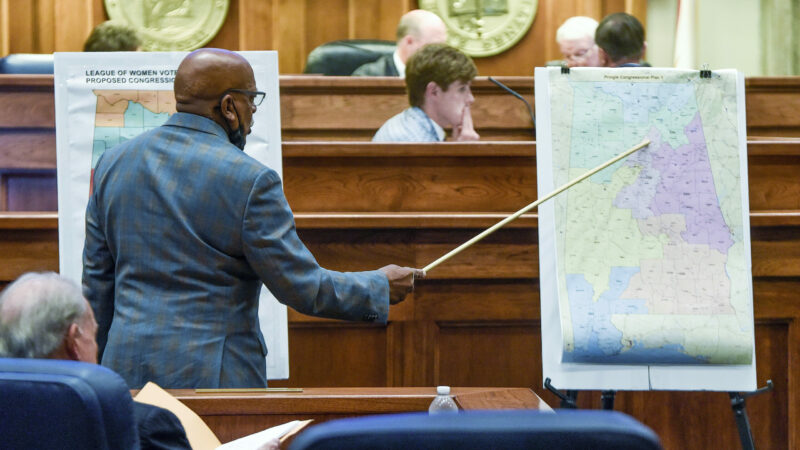Alabama must move quickly to draw new congressional districts
Sen. Rodger Smitherman compares U.S. Representative district maps during a special session on redistricting at the Alabama Statehouse in Montgomery, Ala., Nov. 3, 2021.
MONTGOMERY, Ala. (AP) — Alabama will have to move quickly to comply with a court order to draw new congressional districts for the 2024 elections, and judges indicated Friday that they will give legislators until July 21 to adopt a new map.
The U.S. Supreme Court last week affirmed a lower-court ruling finding Alabama likely violated the Voting Rights Act with an Alabama congressional map that had only one majority Black district out of seven in a state where more than one in four residents is Black. The state must now draw a new map where Black voters comprise a majority, or close to it, in a second district.
“The time constraints struck the court as very real and very immediate,” U.S. Circuit Judge Stanley Marcus said during a status conference in the case. The primaries are set for March 5, 2024, and candidates must qualify with the political parties in November, giving little time to get a new map drawn and approved by the court.
Marcus said the Alabama Legislature will have the first opportunity to draw a new map.
Lawyers for Alabama’s Republican elected leaders and the Black voters who challenged the existing map agreed during a Friday status conference to give the state until July 21 to adopt a new map. That would set the stage for a possible July 17 special session followed by court review by a three-judge panel on whether the approved plan complies with the Voting Rights Act.
Deuel Ross, an attorney representing Black voters who challenged the map, said the plaintiffs agreed to give the state “about a month” to draw a new plan. Ross said the three-judge panel will decide whether the new map complies with its order.
“Plaintiffs would file objections and perhaps its own alternative map,” Ross said on what would happen if plaintiffs disagreed with the map adopted by lawmakers.
State lawyers wrote in a court filing that a special session held July 17 would give time “to receive public input regarding the plan and then propose it to legislators for review before a vote.”
A spokeswoman for Gov. Kay Ivey, who would call any special session, did not confirm the July special session date.
“We are reviewing the outcome and are in discussions. Any possible announcements would come from our office,” Ivey spokeswoman Gina Maiola wrote in an email.
Groups argued Alabama violated the federal Voting Rights Act by diluting the political power of Black voters when it failed to create a second district in which they make up a majority, or close to it. Plaintiffs argued the existing map divided historically connected communities to limit the influence of Black voters in the state’s other six districts.
Pentagon puts Scouts ‘on notice’ over DEI and girl-centered policies
After threatening to sever ties with the organization formerly known as the Boy Scouts, Defense Secretary Hegseth announced a 6-month reprieve
President Trump bans Anthropic from use in government systems
Trump called the AI lab a "RADICAL LEFT, WOKE COMPANY" in a social media post. The Pentagon also ordered all military contractors to stop doing business with Anthropic.
HUD proposes time limits and work requirements for rental aid
The rule would allow housing agencies and landlords to impose such requirements "to encourage self-sufficiency." Critics say most who can work already do, but their wages are low.
Paramount and Warner Bros’ deal is about merging studios, and a whole lot more
The nearly $111 billion marriage would unite Paramount and Warner film studios, streamers and television properties — including CNN — under the control of the wealthy Ellison family.
A new film follows Paul McCartney’s 2nd act after The Beatles’ breakup
While previous documentaries captured the frenzy of Beatlemania, Man on the Run focuses on McCartney in the years between the band's breakup and John Lennon's death.
An aspiring dancer. A wealthy benefactor. And ‘Dreams’ turned to nightmare
A new psychological drama from Mexican filmmaker Michel Franco centers on the torrid affair between a wealthy San Francisco philanthropist and an undocumented immigrant who aspires to be a dancer.







